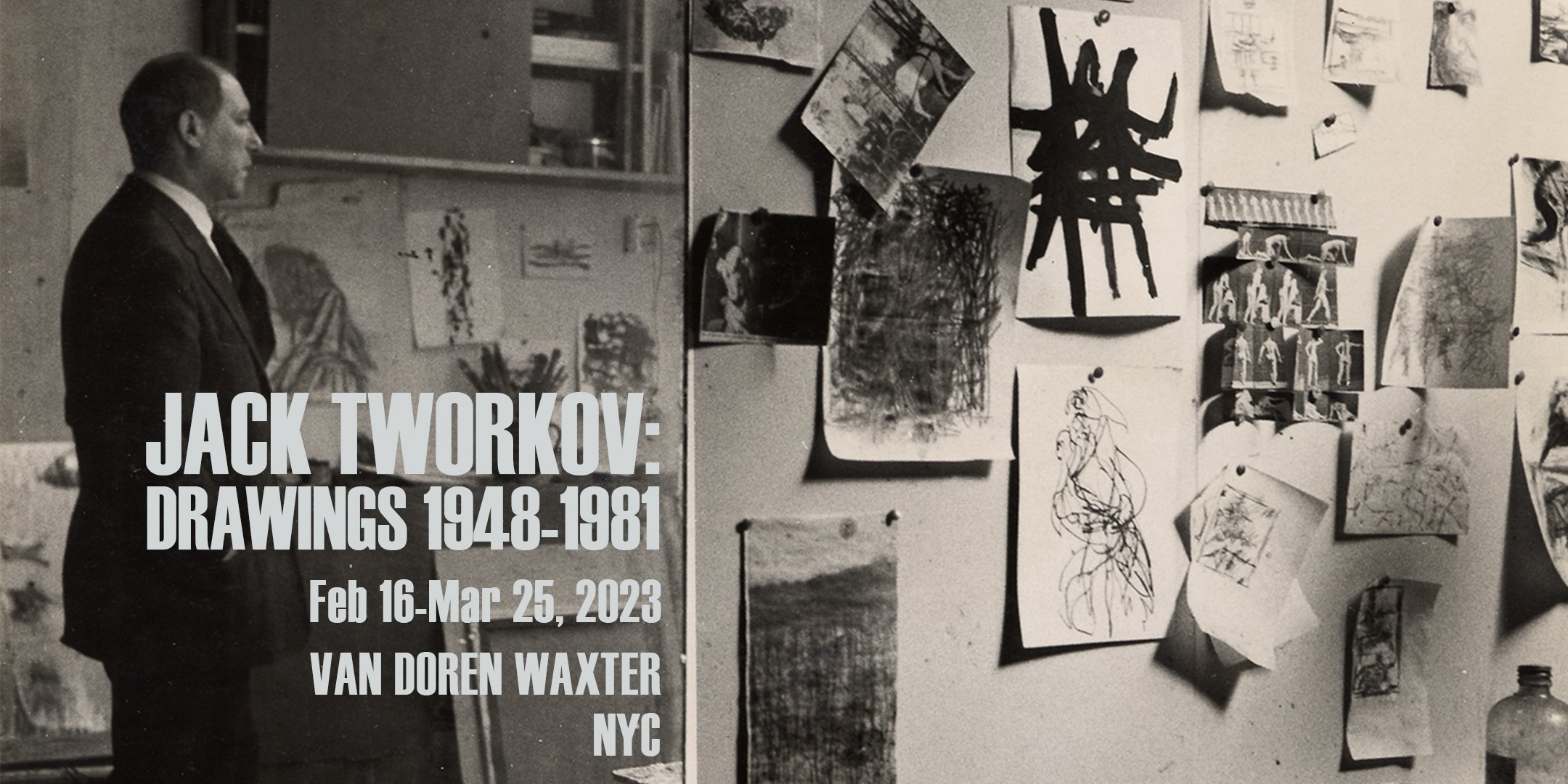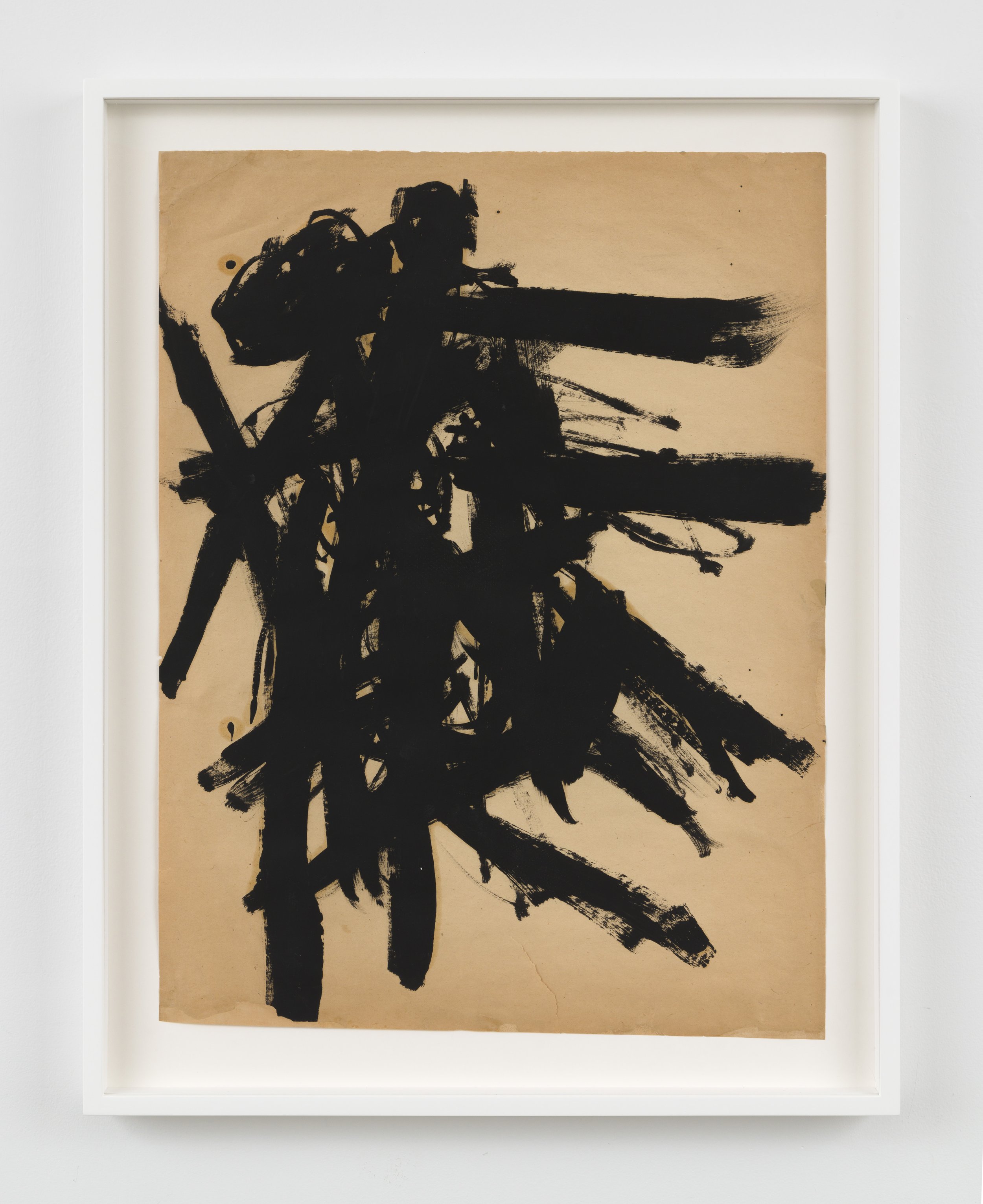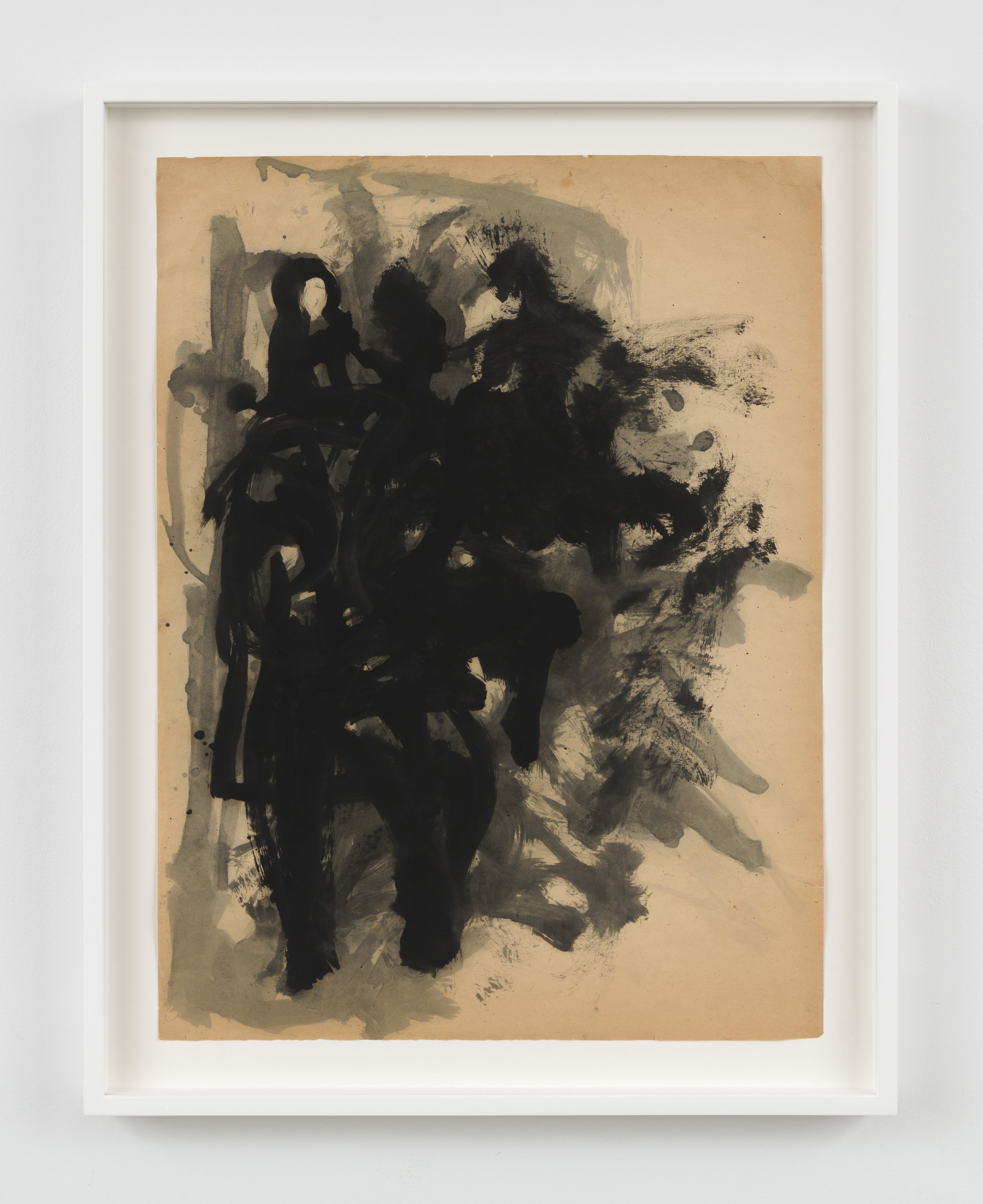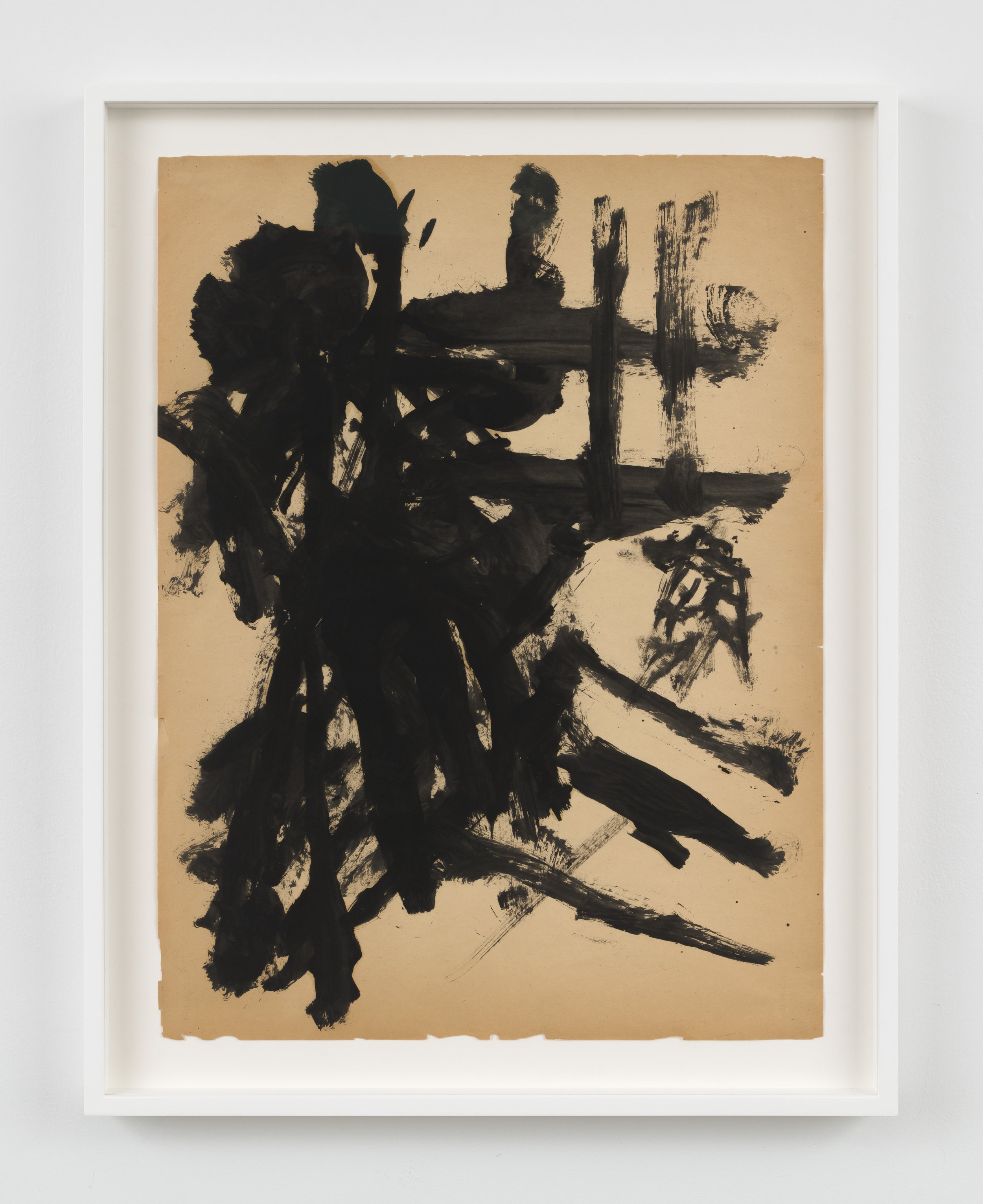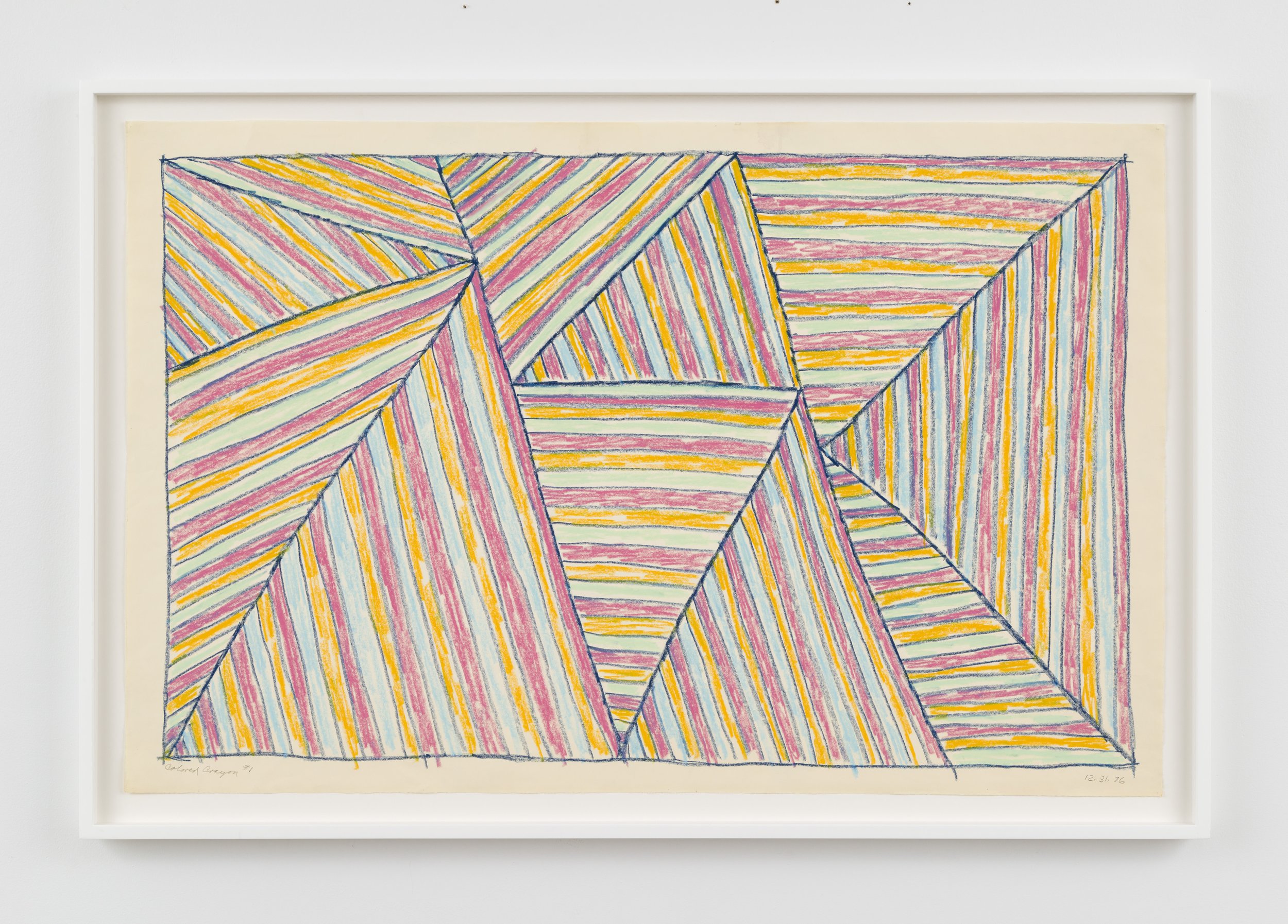Exhibition news: Jack Tworkov: Drawings 1948-1981 (Feb 16-Mar 25)
Jack Tworkov in his studio at 342 Bowery, New York, c.1957. Photo: Dennis Wheeler
“To reduce everything to a piece of paper and pencil I think is just marvelous; it is one of the highest forms of art.”
–Jack Tworkov, 1981
Installation view, Van Doren Waxter, New York, NY.
Untitled (House of the Sun) [CR345], c.1952, oil and graphite on paper, 25 1/2 x 16 in (64.8 x 40.6 cm)
Van Doren Waxter is very pleased to announce Jack Tworkov: Drawings 1948-1981, a sweeping, revelatory exhibition of works on paper made by the artist that are wide ranging in vocabulary, style, material, surface, and scale to go on view at the gallery’s 1907 historical townhouse at 23 East 73rd Street from February 16 to March 25, 2023.
Organized with the Estate of Jack Tworkov, the majority of the carefully chosen thirty-six works have never been shown or reproduced and demonstrate the artist’s practice of drawing to explore, experiment, and as he remarked to an interviewer, to “strike out in wildly different directions.” The varied, visually striking presentation includes a special display of archival material spanning more than four decades of acclaim and achievement.
Tworkov (1900-1982) was at the forefront of American painting for seven decades, from Abstract Expressionism to Minimalism. He forged a disciplined, celebrated aesthetic and artistic career—the one constant being Tworkov’s gestural “mark.” His was a long search for an abstract, painterly ‘mark’, ranging from a full, vigorous embrace and thrust in the 1950s and 1960s, to a more reductive, meditative, and analytic mark in the 1970s and 1980s.
As a leading Abstract Expressionist with a highly trained eye, he confessed he was always “trying to make an analogy to the figure.” An electrifying 1954 sheet depicting a muscular male nude rendered abstractly in energetic dry brush marks invokes his legions of dramatic abstractions in the 1950s and ‘60s. As Fairfield Porter wrote about this period of Tworkov’s work, “As the figures began to develop, the subject tended to become erotic. This is the internal origin of the subject and also the origin of the turbulence of the form. There then begins a pull between this origin on the one hand and aesthetic considerations on the other, which set a direction toward non-objectivity.”
Tworkov remarked that he used color structurally and tonally and “if a color becomes too beautiful… I reject it.” And yet, a trio of richly hued Abstract Expressionist works are high impact, such as a 1960 charcoal and oil pastel made at the height of Tworkov’s gestural output. The small scaled dazzling sheet, with a sense of intensifying drama in the right of the picture of blue and purple slashes and strokes, is of the artist’s monumental Barrier series of paintings. Tworkov said the series contained “large, looming, perhaps threatening masses.”
L to R: Untitled (Abstract Drawing) [CR424], [CR427], [CR617], Ink on paper, 18 x 24 in (45.7 x 61 cm)
Installation view, Van Doren Waxter, New York, NY.
Tworkov’s great gift to himself and to others, most especially his students, was the permission he gave himself in works from the 70s and 80s to create his own criteria for what interested him in his pursuit of drawing and painting. He freed himself from the sweeping gesture to create works that were devoid of associative color putting in place systems that served as predetermined structure to which he, the artist, responded. A brightly hued 1974 geometric work on paper of polygons over a chessboard is an early example from his celebrated systems-based “Knight Series” (1974-1977). An interest in chess informed the cycle of rigid constraints and accidents based on the unique moves of the knight on the board. An inscription in the lower left reads, “Move in straight lines as far as the board will allow. Make right angle turns when possible. No move into the same square twice.”
“39 Continuous Knight Moves (NY 12-31-74 #7) [CR240],” 1974, graphite and colored pencil on paper, 28 3/4 x 20 in (73 x 50.89 cm)
The exhibition culminates in a pair of elegant translucent studies, both 1981, remarkable for their sleek, graceful geometric forms that gently float and arc above grids in a soft pencil on vellum. The following year, art critic and art historian Michael Brenson, writing in the artist’s obituary in The New York Times, argued that the late work “is more restrained and more architectural…lyrical and sometimes radiant” and possessed “a sense of what was limitless and unknown.”
“Color Crayon #1 [CR1460],” Crayon on paper, 26 1/8 x 40 1/2 in (66.4 x 102.9 cm)
About the artist
Jack Tworkov was born in Biala, Poland. He emigrated with his mother and sister, the artist Janice Biala, to the United States in 1913. He graduated from Columbia University in New York in 1923. He studied studio art at the National Academy of Design from 1923 to 1924 and at The Art Students League from 1925 to 1926. In 1929, he began painting year-round in Provincetown, Massachusetts. He taught at Black Mountain College in 1952 in Asheville, North Carolina. He served as chair of the Art Department at the School of Art and Architecture at Yale University, where he taught from 1963 to 1969, received his Master of Fine Arts in Privatum in 1963, and retired as Professor of Painting, Emeritus in 1969. He remained active artistically, intellectually, and professionally until the last months of his life and died in his home in Provincetown in 1982.
Recently, the artist has been included in such significant exhibitions as Epic Abstraction (2019-2020) at The Metropolitan Museum of Art, Artistic License (2019) at the Solomon R. Guggenheim Museum, and Pollock e la Scuola di New York (2018) at the Complesso del Vittoriano in Rome, Italy, and The Shape of Freedom: International Abstraction after 1945, Museum Barberini, Potsdam, Germany traveling to Munchmuseet, Oslo, Sweden, February 23-May 21, 2023.
The artist is represented exclusively by Van Doren Waxter.
